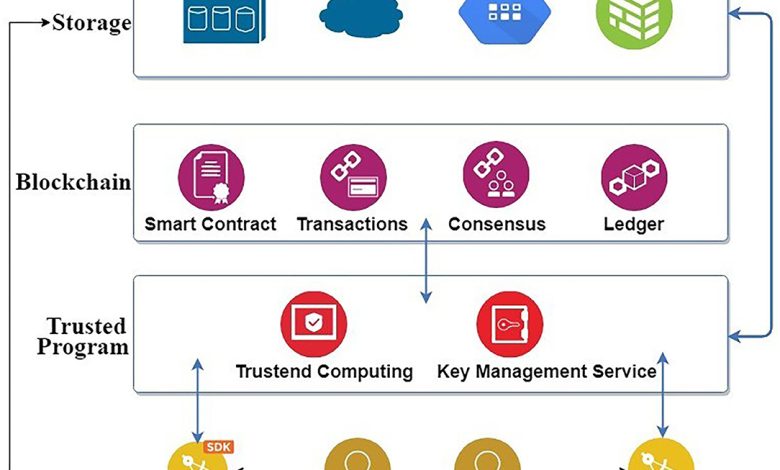How Blockchain Can Improve Data Management

- Understanding the Basics of Blockchain Technology
- The Role of Blockchain in Ensuring Data Security
- Enhancing Data Integrity with Blockchain
- Utilizing Blockchain for Transparent Data Transactions
- Exploring the Potential of Blockchain in Data Management
- Challenges and Opportunities of Implementing Blockchain for Data Management
Understanding the Basics of Blockchain Technology
Blockchain technology is a decentralized, distributed ledger system that securely records transactions across a network of computers. Each block in the chain contains a list of transactions, and once a block is added to the chain, it is immutable and cannot be altered. This transparency and security make blockchain an ideal solution for data management.
One of the key features of blockchain technology is its ability to provide a high level of security. Each block is linked to the previous one using cryptographic hashes, making it nearly impossible for anyone to alter the data without being detected. This makes blockchain a trustworthy system for storing sensitive information.
Another benefit of blockchain technology is its transparency. Since each transaction is recorded on a public ledger that is accessible to all participants in the network, there is a high level of accountability. This can help improve data management by ensuring that all parties have access to the same information.
Blockchain technology also offers increased efficiency in data management. By eliminating the need for intermediaries and streamlining the verification process, transactions can be processed more quickly and with fewer errors. This can lead to cost savings and improved overall performance.
Overall, understanding the basics of blockchain technology is essential for realizing its potential to improve data management. By leveraging its security, transparency, and efficiency, organizations can enhance their data processes and drive innovation in their operations.
The Role of Blockchain in Ensuring Data Security
Blockchain technology plays a crucial role in ensuring data security in various industries. By utilizing decentralized and encrypted ledgers, blockchain provides a secure and tamper-proof way to store and manage data. This technology enhances data security by eliminating the need for a central authority, making it difficult for hackers to manipulate or corrupt information.
One of the key features of blockchain is its transparency, which allows all participants in the network to view and verify transactions. This transparency helps in detecting any unauthorized access or changes to the data, ensuring the integrity of the information stored on the blockchain. Additionally, the use of cryptographic algorithms in blockchain technology further enhances data security by protecting sensitive information from unauthorized access.
Moreover, blockchain technology uses consensus mechanisms such as proof of work or proof of stake to validate transactions and add them to the blockchain. This consensus mechanism ensures that all transactions are verified by the network participants, making it nearly impossible for malicious actors to alter the data. As a result, blockchain technology provides a high level of data security, making it an ideal solution for industries that deal with sensitive information.
Enhancing Data Integrity with Blockchain
Blockchain technology has the potential to revolutionize data management by enhancing data integrity. By utilizing blockchain, organizations can ensure that their data remains secure and tamper-proof. This is achieved through the decentralized and transparent nature of blockchain, which makes it nearly impossible for any single entity to manipulate the data without detection.
One of the key features of blockchain is its ability to create an immutable ledger of transactions. Each data entry is cryptographically linked to the previous one, creating a chain of blocks that cannot be altered. This ensures that once data is recorded on the blockchain, it cannot be changed or deleted without leaving a trace.
Furthermore, blockchain technology utilizes consensus mechanisms to validate and verify data before it is added to the blockchain. This helps in preventing fraudulent activities and ensures that only accurate and trustworthy data is stored on the blockchain. By enhancing data integrity in this way, organizations can have greater confidence in the reliability of their data.
Utilizing Blockchain for Transparent Data Transactions
Blockchain technology offers a revolutionary solution for transparent data transactions in various industries. By utilizing blockchain, organizations can ensure the integrity and security of their data exchanges. The decentralized nature of blockchain allows for a distributed ledger that records transactions in a secure and transparent manner. This transparency helps to build trust among parties involved in data transactions.
One of the key benefits of using blockchain for data management is the immutability of the data stored on the blockchain. Once a transaction is recorded on the blockchain, it cannot be altered or deleted, ensuring the integrity of the data. This feature is particularly valuable in industries where data accuracy and security are paramount, such as healthcare, finance, and supply chain management.
Furthermore, blockchain technology enables real-time tracking and verification of data transactions. This can help organizations streamline their processes and reduce the risk of errors or fraud. By leveraging blockchain for data management, organizations can improve efficiency, reduce costs, and enhance security.
Exploring the Potential of Blockchain in Data Management
Exploring the potential of blockchain in data management can revolutionize the way organizations handle and secure their information. Blockchain technology offers a decentralized and transparent system that can enhance data integrity and security. By utilizing blockchain for data management, organizations can ensure that their data is tamper-proof and immutable, reducing the risk of unauthorized access or data breaches.
One of the key benefits of using blockchain for data management is its ability to create a secure and auditable record of all data transactions. This can help organizations track the flow of data within their systems and ensure that it is being handled appropriately. Additionally, blockchain can enable organizations to streamline their data management processes by automating tasks such as data validation and verification.
Furthermore, blockchain technology can improve data quality by providing a single source of truth for all data transactions. This can help organizations eliminate data silos and inconsistencies, leading to more accurate and reliable data. By leveraging blockchain for data management, organizations can also enhance data transparency and accountability, as all data transactions are recorded on a public ledger that can be accessed by authorized parties.
Challenges and Opportunities of Implementing Blockchain for Data Management
Implementing blockchain for data management presents both challenges and opportunities for organizations looking to improve their data handling processes. While blockchain technology offers enhanced security and transparency, there are also obstacles that need to be overcome in order to fully leverage its benefits.
One of the main challenges of implementing blockchain for data management is the complexity of the technology itself. Organizations may struggle to understand how blockchain works and how it can be integrated into their existing systems. This requires specialized knowledge and expertise, which can be costly to acquire.
Another challenge is the scalability of blockchain. As more data is added to the blockchain, the size of the network grows, which can lead to slower transaction speeds and increased costs. Organizations need to carefully consider how they will manage and store large amounts of data on the blockchain.
Despite these challenges, there are also significant opportunities for organizations that successfully implement blockchain for data management. One of the key benefits is the enhanced security that blockchain provides. Each block of data is encrypted and linked to the previous block, making it nearly impossible for hackers to tamper with the information.
Blockchain also offers increased transparency, as all transactions are recorded on a public ledger that is accessible to all participants. This can help organizations build trust with their customers and partners, as they can verify the integrity of the data in real-time.



